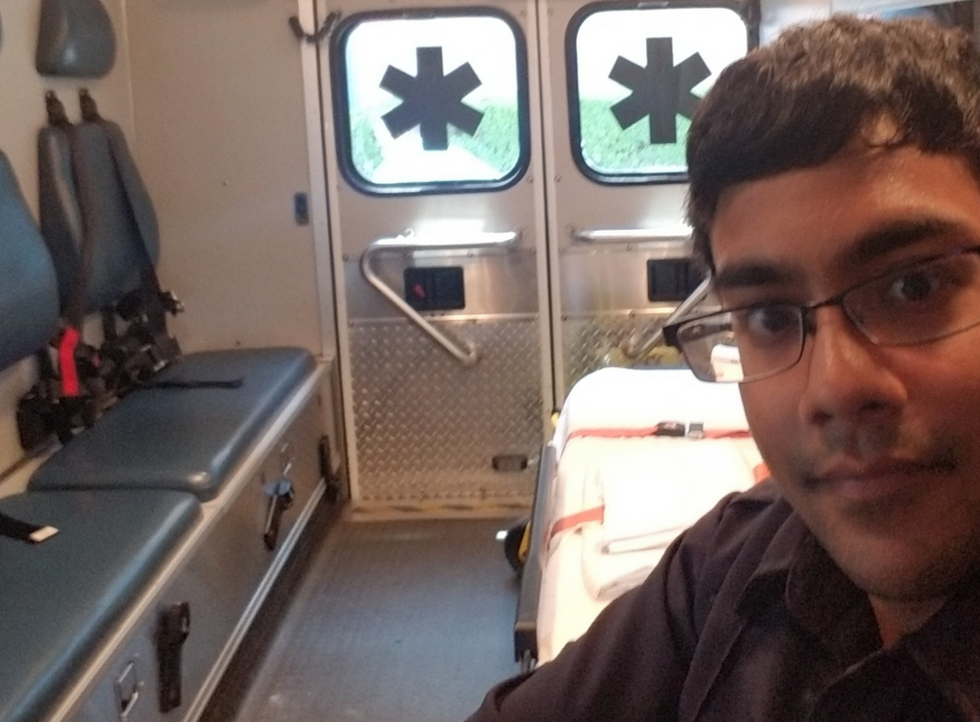Working in emergency medical services (EMS) is in all aspects a blessing. The idea of literally being there for someone during a medical emergency to provide not just care and rapid transport but also comfort and reassurance to patients in need warms my heart to the core. As part of progressing towards EMT certification, my class required that I attend a minimum of two ambulance rotations; in every rotation, I ride in the back of an ambulance on call for an 8-hour shift and observe/assist EMTs with caring for and transporting patients. In my first two rotations, I got a taste of EMS and have a few lessons to take from them.
Much of healthcare is involved in the prehospital setting — that is, treatment and care given before the patient is admitted to the hospital. When an EMT arrives at the hospital with a patient, they must transfer care to a nurse or physician. This means that there is quite a lot of teamwork and coordination that occurs between the EMS agency and the receiving hospital to make the transition of the patient into inpatient care much smoother. As a student observing how the lead EMT gives the attending nurse or doctor the patient care report (PCR), I noticed how every detail must be accounted for when creating PCRs and delivering them to the appropriate medical authority, as doctors and nurses initially treat patients primarily based on what exactly is told to them.
There is also the aspect of moving patients from their homes or vehicles to the ambulance safely and treating them en route to the hospital. If there's one thing to take away from EMS, it's that the primary assessment, packaging, and transport to the ambulance should ideally take as little time as possible, as the basic job of EMS is to not cure diseases or trauma, it's to keep the patient alive and stable until they get to the hospital. EMTs need to learn how to lift, move, and transport patients on a multitude of devices that would stabilize both the patient and the EMTs carrying them to the ambulance. In one case where I had a motor vehicle accident with a patient who was crying from extreme head, neck, and back pain, we had to get the patient's neck immobilized with a collar and then slowly guide them to the stretcher to be taken to the ambulance, taking care each step of the way to avoid aggravating the injury. I also learned that unlike doctors or nurses, however, we were expected to handle patients with far more care due to our role in transport.
Lastly, I learned the most valuable quality an EMT could possibly have is to be calm under pressure. There are many situations where a patient could become combative, emotionally distressed, or unable to tolerate certain forms of treatment. For example, my craziest rotation involved an elderly person who complained of difficulty breathing and turned out to be suffering from both congestive heart failure and COPD. We had to get them to keep breathing oxygen forcibly pumped into her lungs so that any fluid in the alveoli would return to circulation, but the patient nearly gave up due to how stressful it was on their lungs.
We even had paramedics onboard that were desperately trying to get the patient to keep going and remain alive; if they went to sleep, they would stop breathing and eventually die. I tried my hardest to avoid panicking and doing something impulsive. I also was about to come to terms with a patient dying right in front of my eyes despite extreme efforts to save them. It makes me wonder just how doctors and other healthcare providers endure these situations. This case definitely opened my eyes to the more personal and empathetic side that EMTs show when caring for patients, and that empathy is something I wish to carry with me throughout medical school and beyond.
So what did my rotations teach me? Firstly, healthcare is a very integrated system that includes both prehospital and inpatient care. Secondly, there is a lot of patient movement that requires extreme care to avoid injuring them more. Thirdly, being calm under pressure is the golden rule of being a healthcare provider. If I were to take only three things from my rotations as an EMT student, these would be my main ideals. Using them, I wish to complete more rotations and eventually volunteer as an EMT so that I may touch more lives in a positive way to better my community.
















